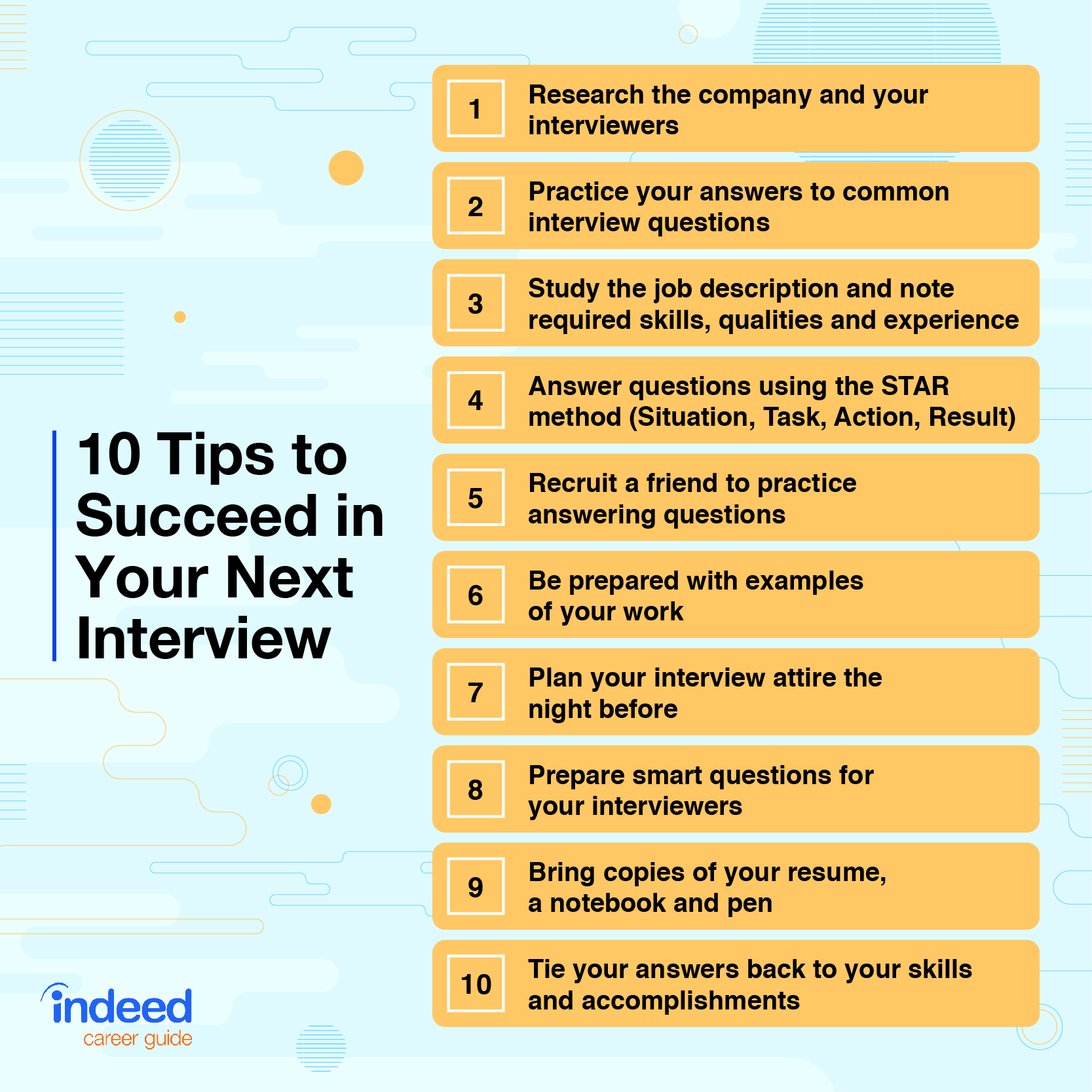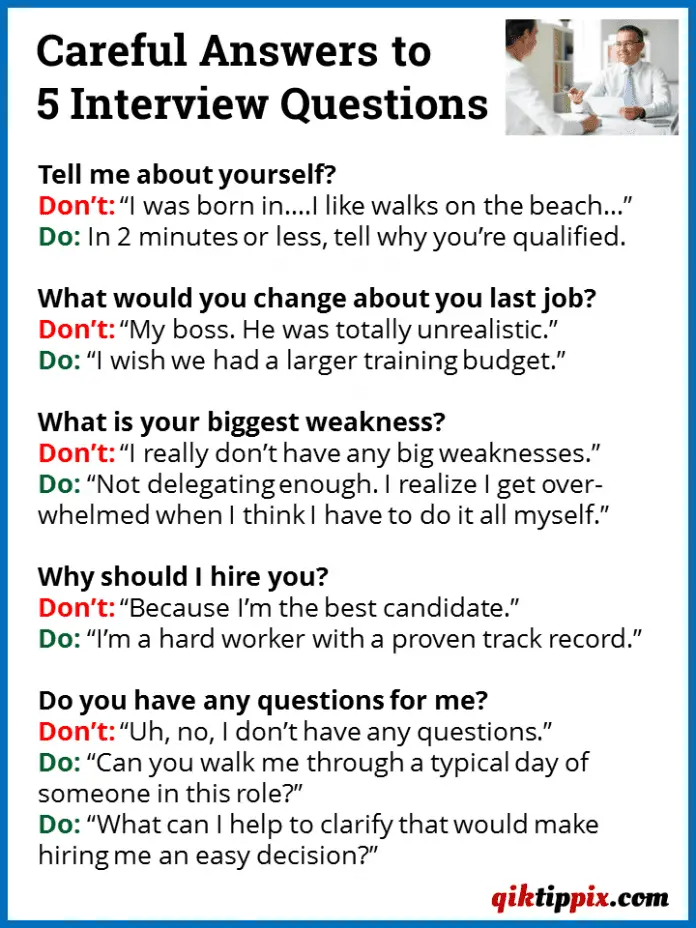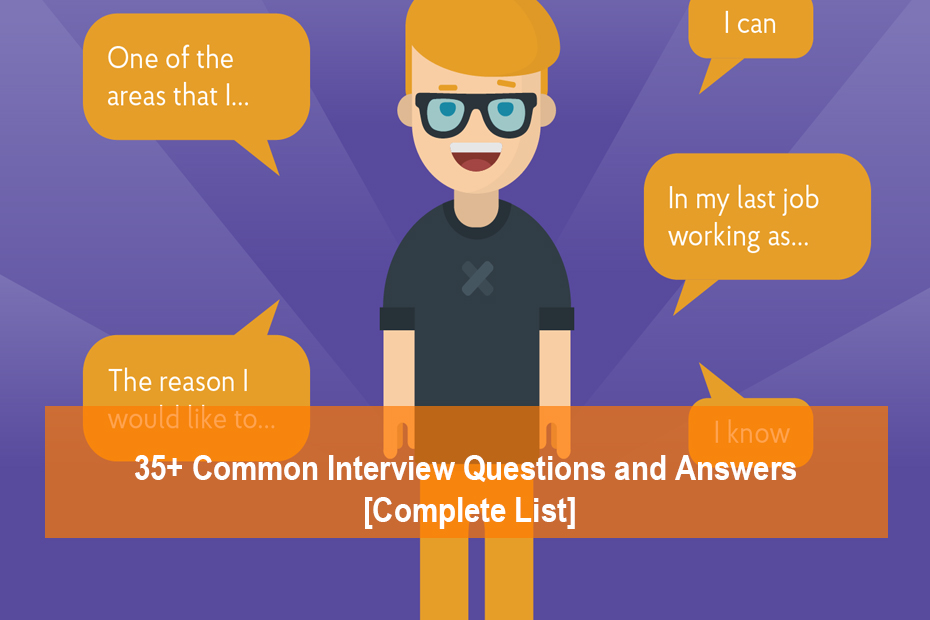35+ Common Interview Questions and Answers [Complete List]
Time came!
After creating a killer resume and cover letter and passing the first round, it’s time to face the final challenge:
Your job interview.
And this scares even the best of us.
Being judged and valued by people who hold your future in their hands is more of a concern than meeting their father-in-law.
You’ve heard the interviewers and hiring managers say there are no right or wrong answers to calm you before the interview.
But here’s the thing:
They almost always look for a specific way of answering.
This brings us to this guide. When you finish reading, we’ll cover the most common interview questions and answers, making you a true interviewer.
So let’s get started!
To make this guide as practical as possible, we’ve covered almost every interview question.
Don’t let this put you off, though. You don’t have to read everything from cover to cover. To get the most out of the guide, we recommend:
- Going through all the common interview questions
- Checking out the situational interview questions section and learning how to answer questions that are relevant for you
- Learning what’s the idea behind behavioral interview questions, so you’re prepared to answer whatever the HR manager shoots at you
How to Answer the Most Common Interview Questions [+ Sample Answers]
- Tell me something about yourself.
- How did you hear about this position?
- Why did you decide to apply for this position?
- What are your strengths?
- What are your biggest weaknesses?
- What do you know about this company / organization?
- Why should we hire you?
- What are your salary requirements?
- Do you have any questions for us?
- What are you looking for from a new position?
- Are you considering other positions at other companies?
- What professional achievement are you most proud of?
- In what type of work environment do you work best?
- Where do you see yourself in five years?
How to Answer Situational Job Interview Questions [+ Sample Answers]
- Why didn’t you get your Bachelor’s Degree / Master’s Degree / Doctorate degree?
- Why did you change so many jobs?
- Why did you change your career path?
- Why did you decide to leave your previous / current job?
- Why is there a gap in your work experience?
- Why did you get fired
- How do you feel about working weekends or late hours?
- How would your boss describe you?
- Do you have any serious medical conditions?
- What would your first 30, 60, or 90 days look like in this role?
- Are you a team player?
- Would you take a risk?
- How do you deal with the pressure or stressful situation?
- Do you think there is a difference between working hard and working smart?
- How quickly do you adapt to new technology?
- Do you have any interests other than work?
- Do you have children? / Are you planning to have children?
- What do you think our company / organization can do better?
How to Answer Behavioral Questions in an Interview [w/ Sample Answers]
- Give an example of how you dealt with a challenge in the workplace before.
- Give an example of when you performed well under pressure.
- Give an example of when you demonstrated leadership qualities.
How to Answer 14 Most Common Interview Questions [+ Sample Answers]

Whether you’re a trainee or a senior professional with ten years of work experience, these are the questions you have to hear in almost every job interview.
- All these questions are used to learn more about you, both as a person and as a professional.
- You may have heard the popular idea that there are no right or wrong answers for job interview questions.
- While this is true, there are a number of rules you must follow when answering these questions.
- If you understand exactly what the interviewer is looking for in each question, you can give the correct answer (and you can rock that interview!)
- In this section, we’ll examine the 14 most common job interview questions and answers. We’ll explain what the HR manager wants to see in you and provide sample answers that you can use.
So let’s get started!
1) Tell me something about yourself.
How hard can it be to talk about yourself? We do it daily, without thinking too much. What are the 10 most common interview questions and answers?,#What are the top 20 interview questions?,#What are the 23 most common interview questions and answers?,#What are the top 5 interview questions and answers?,#What are your top 5 questions?,#What are your weaknesses?,#What is your weakness best answer?,#What are the top 5 questions to ask an interviewer?,#What is your strength answer?,#What are some unique interview questions?,#What are my strengths?,#How do you handle stress and pressure?,#Can you tell me about yourself sample answer?,#What to say to tell me about yourself?,#What is the question of interview with answers?,#Why do you want this job?,#What are your future goals?,#How do you handle conflict?,#What is your life weakness?,#How would you describe yourself?,#What are your career goals?
However, hiring managers aren’t looking for your entire life story, third-grade achievements, or what you ate for dinner last night. Instead, they’re looking for a sales pitch.
This is often the first question asked in an interview, so it acts as your input. Make sure your answer is relevant to the position you are applying for. The aim here is to present yourself as the ideal candidate for the job.
A good rule of thumb is to structure your speaking topics as follows:
- Briefly introduce yourself: What is your name? How long have you been working as a [job]?
- What do you like in your job?
- What are your best 2-3 achievements related to the job you are applying for?
Now, let’s go through some examples:
Possible Answers
- Sample Answer 1:
Hey! My name is John Doe and I have been working as a business analyst for more than 5 years at Companies X and Y.
I studied Information Systems at [Made-Up] University, and I have some background in data analysis.
I’ve done some pretty impressive things in my career (if I say it myself haha).
For example, at Company X, I managed a project to move all operational data to a new data warehouse system to reduce costs. The new solution was much more suitable for our business and eventually saved up to $ 200,000 a year.
- Sample Answer 2:
I’m Jane Doe, just graduated from the University of Wisconsin-Madison.
I just graduated from the Biochemistry department. I know my way through a laboratory and as a chemistry research assistant I have had many opportunities to put my knowledge into practice.
The lab felt like home, so I would love to work as a lab assistant. I am passionate, hardworking and extremely responsible. Also, I look forward to putting everything I learned while in college into practice.
2) How did you hear about this position?
At first glance this may seem like a simple question, but you should take every opportunity you can to show your interest in the company.
Even if you are not constantly refreshing the company’s website for job listings, make it look like it has been (in a professional way, of course). Show excitement and curiosity.
If someone inside the company has provided you with information about the position or recommended you apply, be sure to mention it.
If someone trustworthy can vouch for your skills, you will have much more chances to be hired.
Therefore, state his name and position within the company, and state the reasons for inviting or recommending you to apply for the position. Tell hiring managers what excites you about the job opportunity, or what exactly catches your eye.
Possible answers:
- Sample answer 1:
“I know about [MadeUpTechnologies] for a long time – I’m a big fan of your products. I even have one of the latest phone models!
I love the company’s passion to create super intuitive, beautiful hardware and would love to be a part of it.
So when I saw your job posting on [RandomJobBoardWebsite], although I wasn’t actively looking for a job at the time, I couldn’t help but apply! ”
- Sample answer 2:
“I heard from my former colleague and college friend Jim Doe that [Company X] was looking for a new sales manager. He encouraged me to apply, saying that my experience in managing a sales team [at some Software Companies] would be useful for [Company X].
I’ve heard a lot about [Company X] from Jim and I’m a big fan of the way you do things there. I’ve always wanted to work for a company with a flat organizational structure. ”
3) Why did you decide to apply for this position?
Through this question, the interviewees want to assess how passionate you are for the position. And no, the answer is not:
“I am very passionate about not starving.”
Or…
“I needed money and you guys are paying a lot.”
What the interviewer is looking for here is to see how passionate you are about the job or company. After all, job performance is directly linked to job satisfaction. The happier you are with your position in the company, the more productive you will be.
And here’s the important thing – your passion will be very evident during the interview.
When you are talking to someone who is passionate about something, you can feel them shine while talking. As an HR manager who has interviewed hundreds of people, this is a very good sign to hire the candidate.
If so, use this knowledge to your advantage.
When asked this question, your answer should include 2 things:
- Especially what motivates you to apply for this position.
- Why this company? Have you heard of them before?
Sample Answer 1:
- I am very passionate about sustainability and renewable energy. Actually, I studied a minor in Environmental Science at [XYZ University].
- I’ve always wanted to base my engineering degree on a good purpose, and the position as Sustainability Coordinator at [XYZ Company] is exactly the right thing.
- I’ve been following your company for the past few years and I love how you’ve changed the renewable energy landscape in America.
- However, if you don’t know much about the company or the position, that’s okay too. Just be honest and show your passion for this job. However, it’s always better to do your homework before you go to an interview.
Possible answer 2:
I’ve always wanted to get into marketing. Since I was doing promotional work here and there, I didn’t have the opportunity to do anything more serious.
Yet I believe I have the right skills to get started: copywriting, basic photoshop, and of course plenty of creativity.
So, I thought an internship at [Company X] would be a great start to my marketing career.
Want to find more sample answers to this question? “Why do you want to work here?” Check out our article on the 10 best answers to your question.
4) What are your biggest strengths?
Here are two answers you can go through: your real strengths and what you think the hiring manager or HR representative would like to hear. We definitely recommend that you give the first answer.
For this question, you want to narrow your answer to a maximum of three strengths. Here choose 1 or 2 skills and 1 or 2 personal (more or less unrelated) skills that will really help you excel.
Not sure which are your greatest strengths? See the table below to find out which one is perfect for your space:

Once you’ve chosen your strengths, support it with a situation or story that shows how you use it to benefit you in your business.
After all, words are just that – words. HR cannot know whether your “natural leadership” means a real strength or just that you are super active in your high school classroom.
As you probably already know, this is one of the most common interview questions on the market, so make sure you are prepared for this before meeting with the HR manager!
Possible answers:
- Sample Answer 1:
My greatest strength is that I am good at learning new skills. I’ve done various odd jobs like working as a waiter, house keeper, cook and much more (as you can probably see on my resume).
For most of these jobs, I started getting all the necessary skills within 1 or 2 weeks (basically I have no previous experience).
So even though I don’t have any experience as a bartender, I am pretty sure I have the right certification and I believe I can be successful in a week or two. What are the 10 most common interview questions and answers?,#What are the top 20 interview questions?,#What are the 23 most common interview questions and answers?,#What are the top 5 interview questions and answers?,#What are your top 5 questions?,#What are your weaknesses?,#What is your weakness best answer?,#What are the top 5 questions to ask an interviewer?,#What is your strength answer?,#What are some unique interview questions?,#What are my strengths?,#How do you handle stress and pressure?,#Can you tell me about yourself sample answer?,#What to say to tell me about yourself?,#What is the question of interview with answers?,#Why do you want this job?,#What are your future goals?,#How do you handle conflict?,#What is your life weakness?,#How would you describe yourself?,#What are your career goals?
- Possible answer 2:
My greatest strength is that I am very efficient at working under pressure. Whatever the crisis or stress is, I can make the right decisions on the spot.
As an event manager at Company X, we were holding an IT conference for a client. There was a ton of hiccups at the last minute – some speakers were canceled and the catering company said they would be late for the lunch break. Moreover, our staff was insufficient because 2 of our volunteer organizers got sick and could not come.
Things looked so bleak at that point that we were thinking of canceling or postponing the event. Instead, I took the initiative and listed the problems one by one.
5) What is your biggest weakness?
Ah, this is always difficult!
After all, you don’t want to talk about your flaws during an interview, so it’s guaranteed to be a difficult question.
The trick to answering this question is to realize that the interviewers don’t expect you to be perfect. Everyone has their flaws, weaknesses and things that need improvement.
While asking this question, the HR manager is actually trying to learn:
- Whether you have the right skills for the job. If you are applying for a server position in a busy restaurant and say your biggest weakness is performing under pressure, then you definitely won’t get a callback.
- If you are aware of yourself and really know what your conflict points are.
And NO: Weaknesses that boast false modesty do not count as weaknesses. You cannot say that your biggest weakness is that you work hard or become a perfectionist.
The key here is to talk about a weakness that is real, but could prevent you from doing your job. If you’re applying for the position of accountant, you don’t want to say you are bad at math, right?
It is also good practice to indicate how you are working to overcome this weakness and understand how it negatively affects you. If you can, balance it with a positive side effect: treat it like two sides of the same coin.
Possible answers:
- Sample answer 1:
My biggest weakness has always been my communication skills. As a kid I was pretty shy and anxious. However, over the years I’ve been really working on this topic.
At this stage, I am way better than ever but still far from perfect.
However, this will not have any impact on my job as a programmer. I am very good at working in a team, although I do not have communication skills.
- Sample answer 2:
As a new graduate, I can say that my biggest weakness is the lack of real-life work experience.
Although I have worked on a dozen software projects at university, I do not have the experience of working with an experienced team in a completely agile environment.
However, I am ready to do my best and catch up as fast as I can.
Are you looking for more sample answers about your strengths and weaknesses? Check out our complete guide!
6) What do you know about this company/organization?
A quick search on the “About” page of the company / organization you are applying to will be enough, right? Both yes and no.
Think of this as an open question. There is no real wrong answer here other than:
Incorrect Example
I don’t know anything about this organization. How did I actually get here? Can you call me a taxi right away?
However, the more you know about the company, the better your chances of getting hired.
Imagine 2 equally competent candidates:
- Someone who doesn’t care much about your company and applies only because they know you pay well
- Someone else who has been following your company’s blog for years, loves your product, and has a few friends working in the company
Which one would you choose? Absolutely, the second!
So, with this job interview question, you want to convince the recruiter that you’re the # 2 candidate.
Now how do you do that? Well, a rule of thumb here is to Google a bit before the interview and learn the following about the company:
- What do their products or services do?
- What effect does the product / service have?
- What is the company culture like?
- What is the latest news about the company? How do they perform?
- … and pretty much any other kind of information you can find.
Possible answers:
- Sample Answer 1:
Actually, I hadn’t heard of you until recently. I learned about [Company X] from your job posting at RandomJobBoard.
After doing a little research about you guys, I fell in love with your software and your mission.
Now, I’ve worked with a ton of different project management software – Sample Software 1, Sample Software 2 – but none of them were that intuitive and as intuitive as Sample Software 3.
- Sample Answer 2:
Well, I know you are one of the largest investment banks in [town / state / country]. Company X is in the news frequently – I read that you are investing in some of the latest technology IPOs and that there are several promising biotech companies in your portfolio.
I was particularly interested in your recent investment in [Start X], which I found interesting because of [Y Reason].
7) Why should we hire you?
Ah, the ultimate question of humble bragging.
Now, the real question is: how do you sell yourself without trying to appear arrogant, helpless, or needy?
A good rule of thumb is to stay away from extremes. Do you think you are suitable for this job? Say “You have the right experience”.
Whatever you do, don’t oversell yourself:
“I am the best seller you have ever met!”
Instead, give a general statement (because I’m well suited for the position…) and talk about your experiences and achievements.
Here are 3 general points you can mention:
- How passionate you are about working for the company (and why).
- How your skills match their needs.
- How you will help the company solve its current problems. Refine a metric, set a process, etc.
Possible answers:
- Sample Answer 1:
To begin with, I have all the skills and work experience required for the job. I have worked as a Sales Manager for over 5 years and in the last 2 years I have completed several deals with 6 figures in total.
Oh, and on top of that, I have experience working with tech companies so I will be able to get all product features much faster than other candidates.
- Sample Answer 2:
I have the right skills to excel as an executive assistant. Even though I’ve never worked as a personal assistant before, I am overcoming the bill for the role.
I was very organized as I managed several project teams at my university. I managed the organization of Event # 1 and Event # 2. This included constant communication with 12+ companies, 30 speakers and 15+ sponsors.
I am very meticulous and organized, and I am more than capable of helping the CEO make the most of his free time.
Looking for more sample answers? “Why should we hire you?” Check out these 10+ answers to the question
8) What are your salary requirements?
This is always a difficult question. You don’t want to belittle yourself, but at the same time, you don’t want him to say “No” for giving such an ugly trick.
When replying, keep these 3 things in mind:
- What is the average salary of someone at your skill level?
- How much does the company pay employees of your skill level? GlassDoor should be of great help here.
- Finally, how much are you paid at your current company? In most cases, you can probably negotiate an increase from what you’re getting right now.
The last number you tell them should include all 3 points we just mentioned. Do you know that the company is doing well (and compensating employees accordingly)? You offer a higher salary.
Is your skill level above average? This should be reflected in your salary.
As a general rule, you can understand 2 numbers: what is the “good” scenario and what is the “best” scenario?
Answer the interviewer with your “best” salary and your worst case scenario and they will negotiate.
Or you can answer with a interval and they will likely pick the number somewhere in the middle..
Possible answers:
- Sample Answer 1:
My salary expectation is around $70,000 annually.
- Sample Answer 2:
My salary requirement is in the $30,000 – $40,000 range annually.
9) Do you have any questions for us?
You will hear this question in every interview you attend.
While there is no correct answer, there is an incorrect answer:
No, everything is fine! Thanks, I’ll go show myself.
Instead, you want to show your enthusiasm for the company with this question. Imagine that they have already hired you and started tomorrow – what would you like to know about them?
Remember, though, that the questions shouldn’t be too easy (Well, what is your company doing?).
It is your opportunity to learn more about all the details of this place, as well as showing the recruiter that you are really interested in working for them.
The responses you get from the interviewer can also indicate whether you really want to work there.
So what kinds of questions can you ask? Here are some of the most important:
Possible questions to ask at the end of an interview:
- What does a normal day look like in this company?
- What is the best part of working for the company?
- What’s the worst part of working for the company?
- What are the biggest challenges a person in this position can face?
- What are the most important skills and qualifications required to be successful in this position?
- What do you like most about working for this company?
- What are the most pressing issues and projects to tackle?
- Do you have training programs open to employees?
- What kind of budget is there for my department?
- Why do you have such opportunities for future development?
- What are the performance expectations of someone in this position?
- Do departments often cooperate with each other?
- Are you celebrating birthdays or retirements at the office?
- Do employees often hang out with each other outside of work?
- Is there anything else I can help you with at this stage?
- What is the next step in the recruiting process?
Check out our article for a full list of all the questions you can ask the interviewer!
10) What are you looking for in a new position?
The easiest way to answer this question is to say you’re looking for everything the company has to offer.
Look at it from the potential employer’s perspective. Would they hire someone if they answered this question like this:
Good salary. And uhh, that’s it!
This answer pretty much says that as soon as they get an offer with a higher pay, they will jump ship!
Instead, explain to the interviewer that this job at this company is perfect for you. Talk about what your short-term and long-term goals are and how this position relates to it.
Possible answer:
I want to apply more of my machine learning skills that I developed during my more than 2 years of work at [Startup X]. I was designing a programmatic advertising model there.
I’m now looking for the opportunity to work on a larger-scale project that involves creating programmatic ads for audiences of over 10 million people.
I believe that working with such a large-scale project will enable me to advance much faster in my career.
11) Are you considering other positions in other companies?
Here’s a tough question: How much does the HR manager need to know here?
If you admit that you are interviewing other companies, it may seem like you are not fully committed to the job.
On the other hand, if you say you are not considering other positions, it may seem like you have no other options (and the company has the upper hand in salary negotiations).
The correct way to move forward here is to find common ground between the two answers.
The interviewer probably asks you because they want to know if they are competing to hire you. They also want to know if you are serious about the industry and would like to be legally employed in this field of work.
If you have other interviews listed for other companies, indicate that you keep your options open but prefer this job over others.
Do you have no other choice? Stick to the same approach.
Whatever you do, don’t make it seem like you’re desperate or have no other choice.
Possible answers:
- Sample Answer 1:
Last week I had two meetings with companies in the X and Y sectors.
However, since I am so passionate about both your industry and the work you have been doing for the past few years, I am more inclined to work for you if everything goes well.
- Sample Answer 2:
Not yet – I wasn’t actively looking for work until my friend [name] recommended your company. I’m not looking for any company – I’m interested in an interesting, interesting project like yours.
12) What is the professional achievement you’re most proud of?
This is another version of the question “Why should we hire you”, but it focuses on a very specific achievement.
It’s pretty simple, just talk about your # 1 professional achievement and you’re good to go.
As given, success should be related to the job you are applying for. Suppose you are applying for the position of Sales Manager:
- [Incorrect Example]
“I’m very good at underwater basket-weaving, having woven 20+ baskets in the past year.”
- [Correct Example]
“Önceki satış pozisyonumda, üst üste 6 ay boyunca departman KPI’larını% 50’den fazla vurmayı ve aşmayı başardım”
Yine de, cevabınızda çok spesifik olmak istediğinizi unutmayın. Bunu doğru yapmak için STAR yöntemini kullanmayı deneyin. Şöyle bir şey oluyor:
S: Durum – Sahneyi ve bağlamı ayarlayın.
T: Görev – Sorununuzun veya sorumluluğunuzun ne olduğunu açıklayın.
C: Eylem – Zorluk veya sorumluluğu ele almak için attığınız tüm eylemleri listeleyin ve üzerinde durun.
R: Sonuç – Sonuçların ne olduğunu ve projenin veya şirketin genel hedefine nasıl uyduğunu açıklayın.
Öyleyse, becerileriniz ve deneyimleriniz aracılığıyla şirket için önemli olan bir şeye katkınızı gösteren işle ilgili bir başarı bulun.
Possible answers:
- Sample Answer 1:
My biggest success is that I moved from an intern for 2 years to managing the entire marketing of Company X.
As an intern, I basically had 0 instructions on what to do – it was like “hey, go learn social media advertising and keep it going”. The founders did not expect much from me and especially did not care, as they were 100% focused on making the product work.
Instead of complaining about the lack of direction, I started reading about digital marketing – pretty much anything I could get my hands on. For example, I learned how to do content marketing from Neil Patel’s blog and started putting everything into practice.
My first accomplishment was to get an article that would go viral and earn more than $ 5,000 in a single day. While this might not be much for a software company, it was very important to an intern.
After that, the founding team gave me much more confidence and allocated me a small marketing budget of $ 000 a month. With much more confidence in my abilities, I started experimenting with other strategies.
Then, in the next 2 years, I was promoted to Head of Marketing. After making several hires, I was able to expand our marketing efforts and upgraded the company from $ 2,000 to $ 30,000 per month.
- Sample Answer 2:
My biggest achievement so far is graduating from [University X] in 4 years with a 3.9 GPA. My family couldn’t financially support me, so I had to handle all university bills alone.
Thanks to hard work and dedication, I graduated with almost no student loans. I did this with a combination of:
- Working part time while studying
- Doing seasonal full-time work in the summer
- Maintaining a high CGPA and earning 2 scholarships for 4 years
13) What kind of work environment do you like best?
The purpose of this question is to assess whether you will fit into the company’s working environment.
For example, some organizations are highly structured and hierarchical, require tight organization, and have a well-planned day full of rules and guidelines on how to get things done.
If you’re the creative, game changer who likes to break the rules and innovate, that probably won’t be enough for you.
On the other hand, some companies are more comfortable with much less bureaucracy. If you are working in the early stages of the induction phase, “go sell us more” may actually be your main one-week mission.
If you are the type with certain things to do and goals, you probably won’t like a job like this.
So, takeaway? Different people work best in different settings and that’s okay.
Before going to the interview, check out the company’s website and social media pages to get an idea of the general environment and environment there.
Check out employee reviews on GlassDoor or if you know someone working there, ask them.
Respond appropriately depending on what you have learned.
Possible answers:
- Sample Answer 1:
I work for the best small companies. I don’t really like the corporate world – rules, guidelines, SOPs, etc. I perform best when I have a certain freedom to do things. Would you like to find innovative solutions to problems you didn’t even know you had? I’m your man
Do you want someone to just blindly follow the instructions and do as they are told? So we probably won’t be eligible.
- Sample Answer 2:
I like to work in a young, energetic environment. You know, working towards a common goal with a team of people as passionate as you are?
I like to think of my job as a second home and my colleagues as family.
The last company I worked for had such an environment and I was very successful at it.
I have exactly this feeling about Company X ever since I came here for an interview. So I’m excited to learn how you work!
14) Where do you see yourself in five years?
Sometimes the honest answer to that is “I hope I’m not doing this.” especially in entry-level jobs.
Don’t think the hiring manager doesn’t know this. There are diplomatic ways to get around.
In general, the motivation behind this question is for the interviewer to assess whether you are an ambitious person and whether you have realistic expectations for your career.
Be careful to avoid cliché answers like this …
“On your sofa!”
Or
“As the big boss”
Instead, think realistically about what is the next step from this position and whether it is possible to achieve this within the company you are applying for.
Possible answers:
- Sample Answer 1:
I would like to reach the position of Senior Business Consultant in the next 5 years. During the time frame I want to:
Help more than 20 organizations develop their businesses
Build a personal network of highly specialized professionals
Learn as much as possible about the essentials of running a company as well as optimizing and improving clients’ businesses
- Sample Answer 2:
To start with, I want to find out if accounting is the right field for me. Although I love what I studied at university, I want to see if working in this field feels the same.
If I enjoy this, I would like to specialize in either internal auditing or forensic accounting, as I really like to discover and solve problems. From what I saw from your job postings, you are both hiring, so I hope you will be able to move up from the “trainee” position in the next few months!
Still not sure how to respond to this? We don’t blame you! Sometimes you may not know what to do next week, let alone next year! “Where do you see yourself in 5 years?” Check out our guide to answer his question. job interview question to find more possible answers.
How to Answer 18 Situational Job Interview Questions
Congrats!
You’re past the hard part.
You already know the most common job interview questions, and can probably deflect whatever the interviewer throws at you.
Depending on your specific situation, though, you might also need to learn how to answer these situational job interview questions…
1) Why haven’t you gotten your Master’s Degree/Ph.D.?
As a start, keep in mind that the interviewer isn’t judging you for your decision.
After all, if they were looking for someone with a better degree, they wouldn’t have invited you to an interview. The degree is not the dealbreaker here, but your answer to the question might be.
When asking this question, the interviewer is trying to see your reasoning for pursuing a career instead of getting another degree.
Heck, there’s a chance that if you give them the right answer, they’re even going to like you more than someone with 3 Phds!
So, simply explain why you didn’t think that another degree was the right thing for you at the time.
Don’t say you were lazy or didn’t feel like it, or that it’s a waste of money (even if that might be the case).
Instead, give compelling arguments, such as…
- You wanted to see whether your field was the right one for you.
- You didn’t have the financial resources at the time.
- You wanted to get some practical work experience before committing to another degree.
Possible answers:
- Sample Answer 1:
At this stage of my life, I decided to pursue my career instead of further education. On the one hand, I want to make sure that Marketing is what I want to do with my life.
On the other hand, I believe that in my field, practical work experience is a lot more valuable than academic.
So far, my decision has paid off pretty well – I’ve already gotten a lot of experience doing online marketing for 3+ companies and delivering awesome results to boot.
I might eventually decide to pursue a masters, but at this point, I really don’t see the point in that.
- Sample Answer 2:
Because it’s not in sync with my future career path. I believe that for software engineering, practical experience matters a lot more than having a degree.
I’ve already done an internship as a Junior Javascript Back-end Developer, and I believe that it gave me a lot more knowledge than my B.A. in Computer Science.
While I am eventually planning on getting a Masters, it’s going to be in a more theoretical field, such as Artificial Intelligence.
2) Why have you switched jobs so many times?
If you changed jobs within a very short time (2 or more full-time positions in 1 year), the interviewer must ask about it.
After all, skipping is one of the biggest red flags for HR managers.
Right, you may have a reasonable reason. Perhaps the second company you hired wasn’t a culture for you.
Well, you’ll have to forward this.
Companies tend to be skeptical for the following reasons …
- You can be a funnel. Some people tend to change their jobs as soon as they get a better salary offer.
- You may be unqualified for the job and may quit because you are unable to deliver it.
- You get bored easily and your solution to it gives up.
So, your job here is to convince the interviewer that you don’t belong to any of these 3 categories.
After a few months of being hired, you have to make them understand that you won’t be jumping on board just because one recruiters PM you with a better offer on LinkedIn.
The best way to answer this question is to explain your reason for changing jobs. It can be one of the following:
- Corporate culture was not very suitable. This happens to our best – sometimes the company is not the right company.
- The job description was misleading and you eventually did something that you either didn’t like or didn’t qualify for.
- You have learned that you do not enjoy work and are not willing to try something different. While this may not be the best potential answer, it is honest and most likely the HR manager will understand.
Possible answers:
- Sample Answer 1:
The last company I hired was not what I expected. The hiring manager did not describe the role well enough.
- As you know, I’m a copywriter – writing sales copy. I am working with:
- Landing pages
- -Email marketing
- And sales pages
About a week after I started working at the company, I realized that they were actually looking for something completely different. They asked me to write public blog and social media posts that were far from what I was doing.
It really wasn’t what I expected, and not something I found interesting.
- Sample Answer 2:
For starters, my first job was in a big company right after college. Although I learned a lot about Software Engineering applications there, I also learned that a huge company with many regulations, rules and the like is not for me.
So at the end of my internship there, I decided to try to work at a startup. I enjoyed this job MUCH more as it gave me so much freedom when it came to problem solving. HOW to do I was not told. Rather, I was given the option to find my own solution.
Unfortunately, the company put me back on the job market as it couldn’t raise money.
And here we are – [Company X] is where I want to work almost all the time. I’ve heard a lot about your company culture and I thought I’d really belong there.
3) Why did you change your career path?
If you have recently changed your career path, the interviewer will definitely ask.
Don’t worry – there’s nothing wrong with that.
Many people are experiencing career changes. Some even do it several times in their lifetime!
No one cares if you become a pediatrician in one year and a professional cook in another, as long as you are good at what you do.
When this question is asked, all you have to do is give the correct answer. Explain how your old job is not for you and how much more interesting your job is.
Possible answers:
- Sample Answer
I realized that being a doctor was not for me. While I was enjoying my 3 years in medical school, the 6-year study time was too much.
Before that I wanted to start making money and helping my family, so I dropped out of college and started taking accounting classes online.
At this point, I’ve done 2 internships at [Company X] and [Company Y] so far, I’m pretty good at that.
- Sample Answer 2
Because I enjoy selling more than accounting. After working as an accountant for Firm X for 5 years, I decided I wanted to try something new.
At that time I asked my boss to let me switch to the sales team, and eventually I started liking him AND getting pretty good at it.
4) Why did you decide to leave your previous/current job?
While asking this question, the interviewer wants to learn:
- Did you have a good reason to quit your last job? The HR manager doesn’t want someone to jump off the ship when things go wrong.
Incorrect Example:
“Ah, the company started bleeding cash and was on its way to bankruptcy.”
Correct Example:
“It felt like the time – I got to a point where everything I did felt monotonous. I learned as much as I could in this position while delivering great results. But it was time to move on to something new. ”
- Did you leave on good terms? So, have you gone through the process of leaving your job by instructing your colleagues on how to assume your responsibilities? Or did you say “Adios” and stopped coming to work?
Incorrect Example:
“Things started getting really boring and the boss guy was a little bit cruel. I definitely deserve better, so I dreamed of them and now I’m looking for a new company. Hello!”
Correct Example:
“I did not feel the company’s values coincided with mine. Management was too controlling and micromanagement. I prefer to have some control over my business and contribute beyond my requirements.”
Of course, I passed the boarding smoothly. So, he gave a timely notice of resignation and changed all basic company information for me. ”
- Did you leave voluntarily, or were you fired?
Incorrect Example:
“I got fired for missing work for a week without an excuse.”
Correct Example:
Actually I got fired. The fault was my communication skills then. I misunderstood my supervisor’s instructions and eventually set a higher monthly spend for the ad account for the client. The losses were no more than 3 digits, but apparently, the relationship with the client was already strained, so they broke up.
Of course, I really took this seriously and worked hard to improve my communication skills in order not to make this kind of mistake again. ”
5) Why is there a gap in your work experience?
In most cases, a gap in your work experience doesn’t really mean anything. You probably have a very good reason for this.
However, the interviewer will definitely ask this and you should answer adequately.
There is no secret essence in answering this question, just let the recruiter know about your situation, no matter what:
- Maternity leave
- Health problems
- Caring for a sick family member
- Time off to continue further education
- Moving to a different city
- Working on a personal project
Whatever the situation, explain the situation briefly and continue.
However, one thing to keep in mind is that if you have been laid off or have quit and are having trouble finding a new job, you should be very fine with it.
If the interviewer knows that you are having a hard time finding a job, you will give them an advantage in pay negotiations.
Possible answers:
- Sample Answer 1:
“I had a baby and had to take maternity leave.”
- Sample Answer 2:
“My father was sick, so I should have been the person to take care of him full time for several months.”
6) Why were you fired?
- Now this is a difficult question.
- Getting fired is never good.
- Remember that we are talking about firing, not firing. There is a big difference between the two:
- Your dismissal means that you have been released for something that has nothing to do with your competence. So budget cuts, downsizing etc.
On the other hand, being fired means that you have been released for a reasonable reason. And probably, that’s probably your fault. - If you are fired and the interviewer asks you, you must be honest. After all, they can easily check in with your previous employer.
- Your best bet is to be critical about your mistakes and explain what you are doing to improve.
Incorrect example:
None of them were my fault. My boss is a complete tool and hates me for no real reason. He yelled at me for no real reason! ”
In the example above, the interviewee goes defensive. This is a pretty big red flag for the HR manager.
Instead, try saying something that shows you are aware of your mistakes. ”
Correct example:
“The main mistake was miscommunication. The interviewer was ambivalent about their job responsibilities – they were looking for a top marketer to oversee their email marketing operations, as I understand it.
But at the end of the day, it turned out that the company was struggling to try out email marketing, and especially for someone to set it up from scratch. What are the 10 most common interview questions and answers?,#What are the top 20 interview questions?,#What are the 23 most common interview questions and answers?,#What are the top 5 interview questions and answers?,#What are your top 5 questions?,#What are your weaknesses?,#What is your weakness best answer?,#What are the top 5 questions to ask an interviewer?,#What is your strength answer?,#What are some unique interview questions?,#What are my strengths?,#How do you handle stress and pressure?,#Can you tell me about yourself sample answer?,#What to say to tell me about yourself?,#What is the question of interview with answers?,#Why do you want this job?,#What are your future goals?,#How do you handle conflict?,#What is your life weakness?,#How would you describe yourself?,#What are your career goals?
While I did my best to deliver, it eventually turned out that their niche doesn’t actually need email marketing. This was against the management’s vision, so he decided to let me go. ”
7) How do you feel about working weekends or late hours?
You will be asked this question in one of the following 2 situations:
1) You are applying for a job that requires strange working hours.
In this case, your answer is pretty simple – since you’re applying for a job like this, you probably won’t have any problems with working odd hours.
Sample answer:
“Sure! It’s ok for me to work late hours or weekends as long as you let me know at least a few days in advance.
2) You apply for almost any type of job.
Now, you should refer to this as a red flag. Is the employer just checking your loyalty or looking for someone to work 24/7 without paying overtime?
In this case, ask them to explain what they mean.
Sample answer:
If enough warning is given, of course. Is this something I should do often? Do you offer overtime pay for such situations? ”
8) How would your boss or coworkers describe you?
This question is pretty much the same as “what are your greatest strengths”, the only difference is that it has to be from your boss’s or colleagues’ perspective.
Here, you want to focus on your previously praised qualities and achievements (After all, the interviewer may want a reference!).
There are at least 2 ways to answer this question:
1) Describe a specific situation at work where you excel (and got praise from your boss and colleagues)
Sample Answer
They used to say I was super hardworking. During my weekend vacation, not one, but three of my coworkers fell ill and I had to see them.
The weekend was peak season in Nantucket, so the restaurant was seriously overwhelmed. Suddenly we started to panic from being very prepared for the season.
The service had to jump between public transport and cooking, but overall it successfully managed to survive the weekend. ”
2) Quote a performance review
- If you’ve ever worked in an office job, you’re probably all very familiar with them.
- Has your boss given you a brilliant performance review? Be sure to mention it here!
Sample answer:

“In my last performance review in September, my boss described me as an initiative.
My position as a PR manager includes constantly monitoring the brand reputation of our clients and dealing with it as quickly as possible if something goes wrong.
In most cases, you need to be very proactive – if you wait for your entire team to have a meeting on how to deal with the issue, it might be too late.
There were 4-5 different situations in which I had to take the responsibility and fully react to problems the moment they arise, whether during my working hours or not. ”
9) Do you have any serious medical conditions?
- When asking this question, the interviewer wants to find out if you have any medical conditions that might impair your ability to do the job right.
- In most cases, you don’t have to respond. If you have a medical condition and it has nothing to do with your career, you can choose not to answer or say “No”.
- However, you may want to explain anything that could affect your performance.
- For example, if the job requires you to lift heavy boxes and you are unable to do so due to a situation, you should report this to the HR manager.
Possible answers:
- [Sample Answer 1]
“I don’t have any serious medical conditions”
- [Sample answer 2]
“I cannot lift heavy objects due to problems with my back, but it will have no effect on my performance in an office job”
10) What would your first 30, 60, or 90 days look like in this role?
If you are applying for a senior or leadership role, this question will likely be asked.
You probably already know a lot about your future position and company at this stage of the interview.
Now is the time to show off your knowledge in your field and explain how to start doing things in the company.
So, you can answer the question like this:
For the first 30 days:
You will probably need to get to know the company first. You will learn as much as you can, including information on:
- What does the company do?
- What are the key processes?
- What is your department doing?
- What are the current problems and challenges?
- Where can you help?
Then, during the 60 days:
You will start doing something. From all the information you have gathered, suggest a few (3 to 5) initiatives that you can undertake:
- You oversee the company’s email marketing strategy and suggest improvements
- You will help find better ad copies for Facebook marketing
- You will assist the team with their ongoing marketing initiatives
Within the first 90 days:
You are already starting to make an impact. Describe a few things that you think will work better:
- Online ads will perform 10-20% better
- Email marketing operations will be streamlined with significantly less manpower
11) Are you a team player?
Wherever you apply, the answer to this question is “Yes!”
Even if you’re applying for a purely solo role, you’ll likely still have to work in a team from time to time.
We recommend that you be very specific about your answer here – don’t just say yes. Give the interviewer a precise example of when you excel at working with a team.
Possible answers:
- Sample Answer 1:

“I’m so much better than working in a team, actually. That’s what I love about working in advertising – everyone has their own creative spark and when you combine them all, magic happens!
I am good at both leadership and following in terms of creativity and brainstorming. I am also extremely open to the opinions of others, and I do my best to help them bring these ideas to life without negative comments or criticism. ”
- Sample Answer 2:
Yes, definitely. I am very good at teamwork.
This time while working at [Company X], I was assigned to an existing team working on a web application for a business process management company.
They were working on a tight deadline and needed assistance on the API side.
I optimized the development cycles and supervised a team of three developers while collaborating with the other two development teams.
Everything went well and we managed to finish the project on time. ”
12) Are you a risk-taker?
The answer here is quite deceiving, as it depends on your profession and field.
Ask yourself – is risk taking a valuable skill for the job?
For example, if you are a pilot, the answer is definitely “No!” Must have.
On the other hand, if you are a day trader, risk is an important part of your business.
So respond accordingly, depending on how valuable the risk is to your business.
You can also give a more strategic answer. Let’s say you are working in investment banking. You should be a risk taker to some degree, but being too risky could lead to the entire company going bankrupt.
In such a situation, the strategy is to show that you are all about calculated risk. You’d be willing to take chances, but only when the odds are in your favor. What are the 10 most common interview questions and answers?,#What are the top 20 interview questions?,#What are the 23 most common interview questions and answers?,#What are the top 5 interview questions and answers?,#What are your top 5 questions?,#What are your weaknesses?,#What is your weakness best answer?,#What are the top 5 questions to ask an interviewer?,#What is your strength answer?,#What are some unique interview questions?,#What are my strengths?,#How do you handle stress and pressure?,#Can you tell me about yourself sample answer?,#What to say to tell me about yourself?,#What is the question of interview with answers?,#Why do you want this job?,#What are your future goals?,#How do you handle conflict?,#What is your life weakness?,#How would you describe yourself?,#What are your career goals?
As with most interview questions, you should give examples of situations where you should take risks and what the consequences are.
Possible answers:
- Sample Answer 1:
Yes, I am a risk taker. I believe you should always be willing to take a certain level of risk to achieve real results.
The marketing initiative you initiate is pretty much risk dependent. You can plan everything from start to finish, but no matter how well you plan it, things might not go well.
This is just part of the job – you need to launch risky campaigns regularly to be successful and hopefully one out of every 5 campaigns will bring you huge results. ”
- Sample Answer 2:
“I am not a risk taker, I am more considered a risk manager. As someone who has been in the finance business for years, I can confidently say that there is a risk in everything.
The most important things are to minimize your risks and second, to minimize possible harm if everything goes very, very wrong.
While working at Investment Bank X, we had a very interesting policy to invest in new fintech projects. We would avoid moon shots, high tech projects, and anything that is an experimental business model.
Our strategy was to invest in proven technology. As it is, the product market proven suitability, business model etc. In most cases, these are second companies. We would not invest in this innovative company that is all over the news – instead we invest in the latest competitors. Often times, this has become more profitable and significantly less risky. ”
13) How do you deal with pressure or stressful situations?
If you are applying for a high-stress job, this question is sure to be asked.
The purpose of this question is to see if you are someone who will survive by working at work or fall through the cracks when the first signs of trouble appear.
Obviously, you wouldn’t answer with the following …
“I end up having a panic attack, crying and running away from work.”
Instead, answer it as below…
- Say yes, you tend to perform well in stressful situations
- Give 1-2 examples of a situation where you should perform well under pressure.
Now let’s move on to some real life examples:
Possible answers:
- Sample Answer 1:
“I am very good at working under pressure, although I cannot specifically say that I like stressful situations.
During chaos and panic, I tend to back down, think, plan and prioritize.
For example, there were times when I had to deal with multiple university projects and assignments at the same time. I would divide large assignments into small, individual tasks and prioritize them according to the following:
- How fast can I complete each mission
- Finding out which task will take longer
- Which project had the earliest deadline
This way my business has become much more manageable. When I faced these kinds of situations the most, I performed better overall. ”
- Sample Answer 2:
“Actually, I prefer to work under pressure. I look at this as a challenge – a situation where I really need to improve my game in order to be successful.
As a cook, working under pressure is pretty much a part of the job. I have encountered several situations where the restaurant was inadequate for this situation. Heck, it’s pretty much a fixed thing during peak season.
When a lot of orders come in and we can barely keep up, I tend to be much more productive than usual. ”
14) Do you prefer hard work, or smart work?
By definition, working hard is when you work hard. This is the time you have to work hard to get the job done.
Working smart means doing the job efficiently. If you manage to finish the job in 2 hours instead of 5, you will do the smart job with the same result.
However, keep in mind that by asking this question, the interviewer is trying to understand what the work ethic is like. So, they are looking for a healthy combination of not just one, but both.
So they want you to be a candidate who not only thinks intelligently, but also works hard.
So your answer here should not be one-sided …
“Oh, I love smart work. That’s when you find out what to do and let other people do it, right?”
Instead, explain how you excel at both:

Sample answer:
“I don’t have a particular choice – I believe it’s important to work both hard and smartly to get the best results.
On the one hand, working smarter allows you to find the best and most efficient way to get things done.
On the other hand, working hard means you will do the job right. Even if there is no smart or efficient way to do this, you will be willing to work long hours to do it.
I’m the type that does both.
As an example for smart during my time at [Made Up Corporation], I was in charge of the sales department. As a process improvement initiative, I moved from an old, on-premises CRM to Pipedrive. This increased the department’s productivity by about 20%.
On the other hand, the whole migration process took about 3 months of hard work. Trying to learn how to match and move our data was much more complicated than we expected, as the software we used was out of date. ”
15) How quickly do you adapt to new technology?
Today, whether you are applying for a software engineering job or as a cashier in a supermarket, you’ll need to use technology at least to some extent.
It is very common for a company to adopt new technology – new point of service system, self-checking kiosks, customer management software, etc. What are the 10 most common interview questions and answers?,#What are the top 20 interview questions?,#What are the 23 most common interview questions and answers?,#What are the top 5 interview questions and answers?,#What are your top 5 questions?,#What are your weaknesses?,#What is your weakness best answer?,#What are the top 5 questions to ask an interviewer?,#What is your strength answer?,#What are some unique interview questions?,#What are my strengths?,#How do you handle stress and pressure?,#Can you tell me about yourself sample answer?,#What to say to tell me about yourself?,#What is the question of interview with answers?,#Why do you want this job?,#What are your future goals?,#How do you handle conflict?,#What is your life weakness?,#How would you describe yourself?,#What are your career goals?
Therefore, you should be able to get the new technology as soon as possible. Any new changes shouldn’t hinder your work completely.
Therefore, when answering this question, you should mention how tech savvy you are.
Possible answers:
- Sample Answer:
“I am very tech savvy. I have worked with many different Point of Service systems so far and I have zero difficulty learning how to use new ones.”
As given, I have a computer, used Office 365 and as usual. ”
- Sample Answer 2:
“I’ve always been interested in technology. In fact, I’m the kind of person who is actively looking for new software to help solve business problems in the workplace.
In the past I have worked with 3 different Customer Management Software such as PipeDrive, SalesForce and Zoho CRM. ”
Do you have any interests outside of work?
- If the interviewer asks you this question, take it as a good sign!
- This means they liked your professional background and now they’re just trying to get to know you and see if you fit into the company culture.
- It’s pretty hard to go wrong here if you’re not going to answer something like:
- “I literally have no hobby.”
- or…
- “All I do is play video games all day.”
- Just talk about your hobbies and interests and you’re ready!
- Bonus points if you can also mention something relevant to your job (e.g. creative writing if you’re applying for a copywriting job)
.Possible answers:
- Sample Answer 1
“I’m a big fan of creative writing. I have my own personal short story blog and actively contribute to various online writing communities (like Writing Suggestions on Reddit).
Oh, I’m also a big fan of the New York Giants. ”
- Sample Answer 2
“Well, I’m very interested in all kinds of sports. I like to stay active because it really helps me to be productive. I’ve done a little of everything in the past 2 years – fencing, archery, hiking and many other things.”
17) Do you have any children?/Are you planning on having any children?
Many companies don’t want to hire someone to take maternity (or paternity) leave after a few months.
The problem is, it’s illegal to ask this question. Companies are not allowed to discriminate based on family status.
So feel free to give a general answer:
Possible answers:
“
I have no children and I am currently not planning to have children. ”
“Right now my main focus is on my career (not my personal life).”
However, we recommend that you rethink working for a company that follows suspicious practices legally.
18) What do you think our company / organization can do better?
That’s interesting!
While it’s not very common for most organizations, it’s a favorite of tech companies.
How come? Well, answering this question shows a few things …
- You are really passionate about the organization and do your research
- Not afraid to give feedback
Obviously, you have to be very political about your feedback. You can’t say that:
Incorrect example:
“Lots of things really. For example, I don’t like this interview.
And your product is a little awful, don’t be offended. But hey, there’s always room for improvement, right? ”
Instead, you want to show your research. Talk about anything that might appear inappropriate about their products or business:
Correct example:
“I looked through your resume maker before coming to the interview and found a few things that seem counterintuitive.
Not to say that it was too hard to understand, but it took me a while to understand things.
If you want, I can open my laptop and show you what I mean. ”
How to Answer 3 Most Common Behavioral Questions in an Interview [w/ Possible Answers]
Finally, behavioral job interview questions are questions that focus on how you have performed in the past or how you would perform in a particular situation.
They are used to understanding your thinking patterns and whether you can think on your feet.
Remember the STAR method we discussed from start to finish? Well, it can be used to answer any behavioral interview questions.
To refresh your memory, the main idea behind the STAR method is that each answer includes the following:
- S: Status – Set the scene and context.
- T: Task – Describe what your problem or responsibility is.
- A: Action – List all the actions you have taken to address the challenge or responsibility and focus on them.
- R: Conclusion – Explain what the results are and how they fit into the overall goal of the project or company.
Here are 3 of the most common behavioral interview questions (with sample answers):
1) Give an example of how you have handled a challenge in the workplace before.
In this case, what interviewers want to know is how well you deal with conflict and difficulties.
So, the answer here should be pretty simple. You should describe a problem you encounter at work and explain how you solved it.
Possible answers:
- Sample Answer 1
“During my last job as a Google Ads specialist, one of the company’s customers had accidentally murdered their ad account. I noticed this over the weekend and found that they basically didn’t spend money on anything.
I took the initiative and immediately contacted the customer to inform them about the problem. Then we had an impromptu meeting that same day and corrected the calculation before any real damage occurred. ”
- Sample Answer 2
“During my last job, I was managing the creative and web development team responsible for building an online store for a client. Two days before the deployment, we found a major bug that turned the entire front-end user experience upside down.
Now, we could extend the deadline a little, but that would ruin our relationship with the customer. The project was already delayed once due to unforeseen circumstances, so it was a do or death.
I created a task force consisting of web developers on my team and some software engineers from another department. We focused 100% of our time on solving the problem and finally managed to get started just in time. ”
2) Give an example of when you performed well under pressure.
For any high-stress work environment, you’re guaranteed to get asked this question.
Possible answers:
- Sample Answer 1
“I actually perform much better when under a lot of pressure. The sense of urgency and importance really motivates me to improve my game and make sure everything is working properly.
While working as a Financial Analyst at [MadeUpFinanceCompanyInc], most of the job was under very high pressure. I had to go beyond duty limits to make sure we were meeting the tight deadlines set by our customers. This usually meant working 12 hours on days and sometimes on weekends. ”
- Sample Answer 2
“As a seasonal worker, my entire career is high pressure, haha… My last job was a line cook at SomeRestaurant in JacksonHole, Wyoming, during the summer.
About 3 out of 4 months were super stressful – LOT of work and the restaurant was almost always full. Heck, I even had to skip breaks just to make sure our staff wasn’t running low. ”
3) Give an example of when you showed leadership qualities.
Are you applying for a leadership position? Definitely this behavioral interview question will be asked.
Keep in mind, though, that this issue doesn’t mean you have to hold a managerial position.
What the interviewer wants is a situation where you take the initiative and manage a project or initiative.
Possible answer:
“As an entry-level marketer, not much was expected of me at SoftwareCompanyInc. What I had to do was research and complete the tasks assigned to me.
During a content marketing brainstorming session, I came up with a great idea to market the company. The bottom line was that we were interviewing clients of the company who were very good at using the software, creating case studies of exactly what they were doing and incorporating it into our email marketing strategy.
The Marketing Director liked the idea and commissioned me to run the project with flying colors. ”
[BONUS] Job Interview Infographic
Now is a quick recap! Check out our new infographic on some of the most common interview questions (and how to answer them):

Additional Interview Preparation Tips
And we are finally here!
If you’ve made it to this point, you definitely deserve a high five!
Now, before we wrap up the article, let’s move on to a few key tips to be successful in your interview.
- Make sure you are ready to answer all common job interview questions. Wherever you apply, you will likely be asked a few of these questions.
- Consider your answers to the situational interview questions (whichever applies to you). So the gap in your work experience, why you were fired, etc.
- Understand how to answer behavioral job interview questions. This shouldn’t be difficult if you know how the STAR method works.
- Follow basic interview etiquette. Make eye contact with the interviewer, but be polite, etc.
And finally, good luck with the interview! You can!














Comments